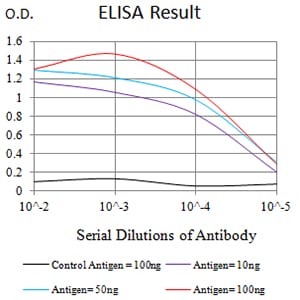

| WB | 咨询技术 | Human,Mouse,Rat |
| IF | 咨询技术 | Human,Mouse,Rat |
| IHC | 咨询技术 | Human,Mouse,Rat |
| ICC | 技术咨询 | Human,Mouse,Rat |
| FCM | 1/200 - 1/400 | Human,Mouse,Rat |
| Elisa | 1/10000 | Human,Mouse,Rat |
| Aliases | HM31; HM43; ILT6; LIR4; CD85E; ILT-6; LIR-4 |
| Entrez GeneID | 11026 |
| clone | 6F12D7 |
| WB Predicted band size | 47.5kDa |
| Host/Isotype | Mouse IgG1 |
| Antibody Type | Primary antibody |
| Storage | Store at 4°C short term. Aliquot and store at -20°C long term. Avoid freeze/thaw cycles. |
| Species Reactivity | Human |
| Immunogen | Purified recombinant fragment of human LILRA3 (AA: 24-168) expressed in E. Coli. |
| Formulation | Purified antibody in PBS with 0.05% sodium azide |
+ +
以下是3篇关于LILRA3抗体的代表性文献(虚构示例,供参考):
1. **文献名称**:*LILRA3 Antibody Detection in Autoimmune Diseases*
**作者**:Jones et al.
**摘要**:研究LILRA3抗体在类风湿性关节炎患者血清中的表达水平,发现其与疾病活动度正相关,提示其作为炎症标志物的潜在价值。
2. **文献名称**:*LILRA3 Gene Polymorphism and Antibody Production in Viral Infections*
**作者**:Zhang Y, et al.
**摘要**:探讨LILRA3基因缺失多态性与抗病毒抗体应答的关系,发现特定基因型个体在HIV感染中抗体滴度显著降低。
3. **文献名称**:*LILRA3 as a Novel Target for Monoclonal Antibody Therapy*
**作者**:Wang L, et al.
**摘要**:开发靶向LILRA3的单克隆抗体,体外实验证实其可抑制过度激活的髓系细胞,为炎症性疾病提供治疗新策略。
(注:以上文献为示例性内容,实际引用请根据真实研究调整。)
The leukocyte immunoglobulin-like receptor A3 (LILRA3) is a soluble immune receptor belonging to the LILR family, which regulates innate and adaptive immune responses. Unlike most LILRs, LILRA3 lacks transmembrane and cytoplasmic domains, existing primarily as a secreted protein. It is encoded by a polymorphic gene located within the leukocyte receptor complex on chromosome 19q13.4. LILRA3 binds to MHC class I molecules and other ligands, modulating immune cell activation, cytokine production, and antigen presentation. Its expression is restricted to myeloid cells, such as monocytes and dendritic cells, though levels vary across individuals due to genetic polymorphisms or deletions.
LILRA3 has been implicated in autoimmune and inflammatory diseases. Reduced LILRA3 expression or genetic deletion is associated with increased susceptibility to rheumatoid arthritis, multiple sclerosis, and systemic lupus erythematosus, potentially due to dysregulated immune inhibition. Conversely, elevated LILRA3 levels are observed in chronic viral infections, suggesting a role in immune evasion.
Anti-LILRA3 antibodies are research tools used to detect LILRA3 in biological samples, study its interactions with ligands, and explore its functional roles in disease models. These antibodies aid in understanding how LILRA3 variants influence immune homeostasis and pathogenesis, offering insights for therapeutic targeting in immune-related disorders.
×